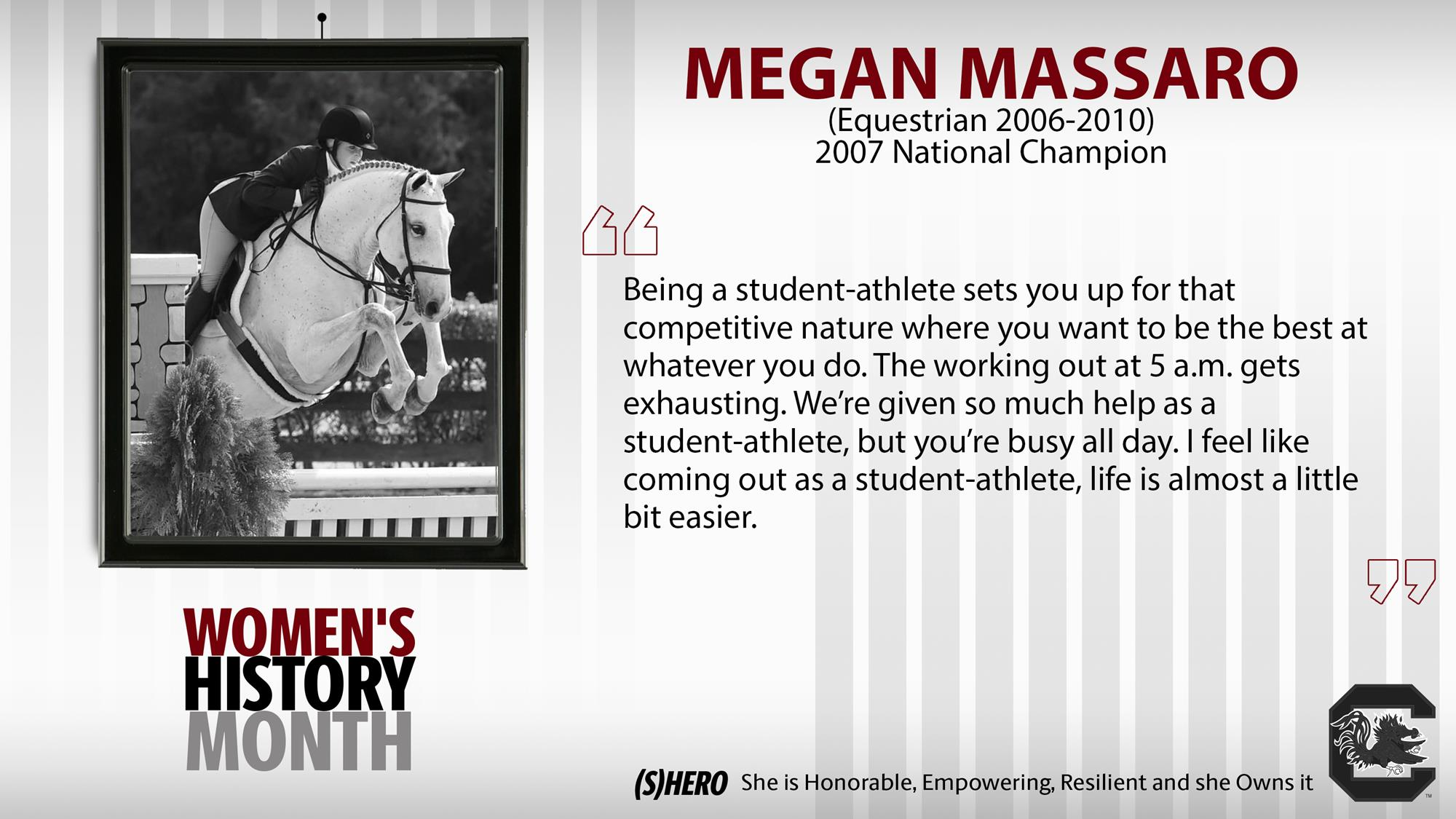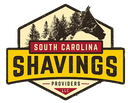
Equestrian Alumni Reflect on Impact of Being a National Champion Student-Athlete
South Carolina celebrates Women’s History Month by catching up with current and former Gamecocks who have achieved greatness in and out of their sport.
Once a champion, always a champion. South Carolina has won three NCEA Overall National Championships (2005, 2007, 2015), and that experience has made a lasting impression on the student-athletes, which some have used to help them transition to their careers after college.

Samantha (Chiodo) Columbus and family.
“The biggest challenge moving from the athlete realm to the full-time job realm would be the physicality of being an athlete,” said Samantha (Chiodo) Columbus (2011-2015), who was part of the 2015 National Championship team and now lives in Nashville, Tenn., where she works in finance for Edward Jones. “You’re practicing and working out all day long. When you’re in a nine-to-five job, you’re sitting at a desk all day. The good thing about being an athlete and moving to the professional world is you’ve already figured out a way to manage your time. Things like that come pretty easily.”
“I feel like being a student-athlete was more of a challenge itself!” said Megan Massaro (2006-2010), who lives in Fort Worth, Texas, and helped the Gamecocks win the 2007 National Championship during her freshman year. “In my professional career, I have it easy compared to what the four years (of college) were. Being a student-athlete sets you up for that competitive nature where you want to be the best at whatever you do. The working out at 5 a.m. gets exhausting. We’re given so much help as a student-athlete, but you’re busy all day. I feel like coming out as a student-athlete, life is almost a little bit easier.”
“Time management and responsibility to your teammates and now to my clients,” added Tara (Brothers) Niculescu (2002-2006), who graduated in 2006 with a degree in marketing and works as a professional hunter/jumper horse trainer in her hometown of Bend, Oregon. “You learn that it’s not only about you. It’s about everyone around you. That’s unique in our sport because as juniors, we’re all individuals. It doesn’t really matter what anybody else does. Becoming a student-athlete was really the first time I was on a team. That changes your perception of the way the sport can be.”
Niculescu also won the individual national championship in 2004 before equestrian switched over to the NCEA team championship format. She was also part of the 2006 South Carolina team that won the Hunt Seat Competition National Championship.
While they may not be competing like they used to, the former Gamecocks have just as much passion for their new lines of work.
“I like how every day is different,” said Massaro, who earned a degree in business administration. “Everybody’s issues are always different, whether it’s title-related or personal-related, ultimately I help people to be able to refinance their properties. Some days I can talk to 50 people.”
“I love my job!” Niculescu gushed. “I love the horses. I love working with the people. I love the travel. I feel really fortunate that I get to do what I do. I have lots of good days. I get to be in the sunshine, and I have 10 horses ready for me to ride them. I’m so lucky in what I get to do.
“I sort of lucked out in getting into it. I intended to have a marketing job, but as graduation was approaching, someone called me and offered me a position working for a private family. I did that, and then I got offered a job working for a bigger barn back in Oregon. Now, I have a great business partner that I work with in Bend. It sort of kept working out.”
“They do a very good job to give student-athletes what they need. That’s a hard thing for a lot of universities to do.”
– Tara (Brothers) Niculescu
“I like a lot about my job,” said Columbus, who graduated with a degree in marketing and management and got a foot in the door as a student by interning with Edward Jones. “I get to interact with our clients a lot. These days it’s a little different because everything is Zoom or over the phone, but I get to help folks with their retirement assets. It’s exciting to go through the process and help them achieve their goals.”

Tara (Brothers) Niculescu
Reflecting on those championship seasons during their careers, the former student-athletes appreciate the challenge of reaching the pinnacle of their sport.
“The individual one was really neat because there are some very famous equestrians who have won that national championship,” Niculescu said. “That was a huge honor. The team championship felt totally different because it was the team. Everybody came together. That was really a special moment because everyone peaked when they were supposed to peak.”
“There aren’t many people who get to say they are a national champion. So that’s really neat. It still comes up in conversation. It’s also great for the young girls who are coming up below me to say, I did it, you can do it! If you work hard and plan your path the right way, you can be on a national championship team as well. It helps my business a lot!”
“That week is always a grind for the team,” Columbus said. “Things all sort of fell together, not just for me, but for a majority of the team. We worked hard all year. We had a rough SECs. We sort of came together and regrouped after that. Everything just happened the way it was supposed to. When we went into that (national championship) round, we were pretty confident. Everything just fell into place.”
“I feel like all four years of my career there as a student-athlete were really good,” Massaro said. “We weren’t able to clinch the title the remaining three (years). Prior to college, [equestrian] is an individual sport. There is no team. You win or you don’t win. The best thing about being a student-athlete was that now you’re on a team. That whole (freshman) year was a learning experience for me, but I was able to learn how to win as a team, lose as a team, and to win a national title. It’s something that very few people get to experience.”

Megan Massaro and family
As the years go by, the Gamecock alumnae still enjoy a close bond with their former teammates and coaches.
“Some of my teammates are my best friends,” Columbus said. “They were my bridesmaids in my wedding, so we talk every day. My best memories are just the days going to practice, hanging out with my teammates, being around my coaches, enjoying the life as a student-athlete. We’ve got it pretty good as a student-athlete at South Carolina.”
“The workouts and just being with my teammates, being with the girls constantly is a great memory,” Massaro said. “I think about it all the time. Just traveling with your teammates and being a team and being able to be with other student-athletes, that was just an incredible experience.”
As they continue to move forward in their careers, each is willing to offer advice to current student-athletes as they look to make their way in life after sports.
“Remember what you learned as a student-athlete,” Niculescu said. “It doesn’t matter what your career ends up being, but the time management comes into it, the responsibility to your team, regardless of whether it’s in an office building or whatever. Not many people are going to have a job solely on their own. Everyone relies on you in different ways. It doesn’t matter what your title is, somebody is dependent on you. Remember all the work that allowed you to be a student-athlete, and that can translate into your new career, whatever that may be.”
“Definitely lean on the connections that you make at South Carolina,” Columbus said. “That was a big thing for me; having all those teammates and the coaches that I was close with. Be a member of the different associations that are close by. It is a hard transition. The more you can keep that connection with the folks you met at Carolina, the better.”
“The biggest I could give is to utilize the resources you are given,” said Massaro. “There are so many opportunities in having the title of a student-athlete to reach out to past coaches and different coaches. That helped me the most. I think lots of people feel nervous or like they don’t know what they’re going to do because they’re whole life has been this sport up until this point. South Carolina Athletics in particular is really good about giving these resources out. They just need to be used!”
Columbus, Massaro, and Niculescu will always be a part of something special as national champions, but with the success of all the women’s sports at South Carolina, they’re also proud to be a part of something bigger than themselves.
“It makes me really proud,” Niculescu said. “The University of South Carolina does a really great job with their athletics and supporting the women’s teams. I don’t feel like the men’s teams got more than the women. The equestrian program is a very expensive program, and they do a very good job to give student-athletes what they need. That’s a hard thing for a lot of universities to do.”
“I’m so proud. I was talking to my two step-daughters the other day. I still talk about our women’s basketball program,” said Massaro. “It’s still bragging rights today. It’s so nice to be part of that athletics program. (Being a national champion) means everything. To this day, it’s something I’m still proud of. I’m so grateful I was given the opportunity and could be an instrumental part of that. It made a huge impact on my life.”













